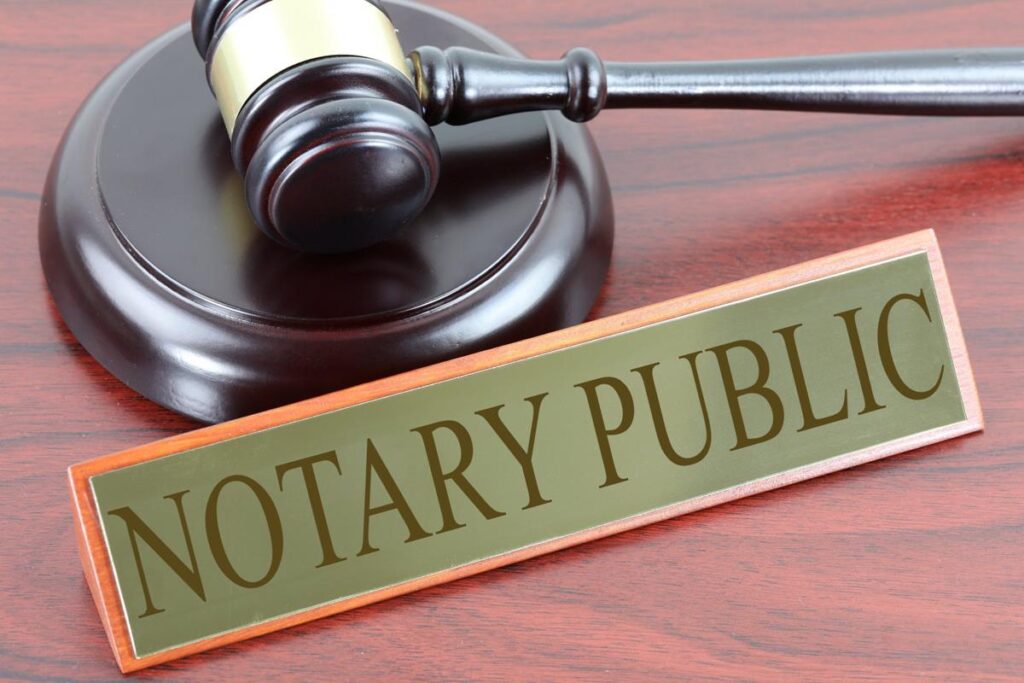What is a mobile notary, exactly? Notarization – a formal process verifying the authenticity of a signature and the identity of the signer – plays a crucial role in various legal and financial transactions. Especially for individuals unfamiliar with legal systems in a new country, understanding the ins and outs of notarization can be daunting.
Traditionally, this process involved visiting a notary public’s office, potentially having to deal with inconvenient hours and locations. However, in today’s fast-paced world, we have a much more convenient solution: mobile notaries.
In this article, you will understand what is a mobile notary, the many benefits of working with them, a list of common services provided by this professional, and a walkthrough on how mobile notarization works from start to finish.
Whether you’re a local resident or a foreigner dealing with legal paperwork, this guide will give you all the information needed to embrace the efficiency and accessibility only mobile notarization can provide!
You may also like: Can a notary refuse to notarize a document?
What is a mobile notary?
Traditionally, notarization required carefully managing office hours and potential scheduling conflicts. Our fast-paced world demands a different solution, and that’s where mobile notarization services come in.
The mobile notary is a specially trained professional who offers notary services on the go. Unlike traditional notaries who work from a fixed location like an office or a bank, mobile notaries travel to meet clients wherever they need notarization services.
These professionals are equipped with the necessary tools and expertise to handle a variety of documents requiring notarization, from legal papers to real estate transactions.

Benefits of working with mobile notaries
The convenience factor might have captured your attention at first, but the benefits of hiring a mobile notary go far beyond saving time and avoiding traffic jams. Here are some key advantages to consider:
- Schedule on your terms: no more fitting your needs around inflexible office hours! Mobile notaries work around your schedule, whether it’s early mornings, evenings, or weekends;
- Location flexibility: whether at your home, office, hospital room, or even a coffee shop, mobile notaries meet you wherever you are, accommodating numerous situations. This is especially important for individuals with physical limitations or those unable to travel, benefiting greatly from the on-site service provided by mobile notaries;
- Streamlined process: get everything done in one go. The notary arrives with all the necessary supplies, eliminating the need for separate trips to print, copy, or find a traditional notary;
- Reduced paperwork: some mobile notaries offer electronic document signing and storage, further minimizing paperwork hassle;
- Direct interaction: discuss your specific needs and questions directly with the notary, ensuring a clear understanding and personalized service;
- Tailored solutions: depending on the notary’s services, you might benefit from additional assistance, such as witnessing signatures for multiple individuals or providing loan signing agent services;
- Professionalism you can trust: state-commissioned and insured, mobile notaries guarantee the legal validity and security of your notarized documents.

Common services provided by a mobile notary
While the core service remains witnessing signatures and verifying IDs, mobile notaries today often go beyond the basics. Here are some standard services they offer:
- Notarization of various documents:
- Real estate documents, including deeds, loan applications, and closing papers;
- Business documents, like contracts, agreements, and corporate resolutions;
- Personal documents, such as wills, trusts, and power of attorney forms;
- Medical documents, like healthcare directives and consent forms;
- Travel documents, including passports and travel affidavits;
- Certified copies of documents: mobile notaries can create and certify copies of original documents, ensuring their authenticity for various purposes;
- Loan closings: some mobile notaries are certified as loan signing agents, facilitating efficient and secure loan closing processes at your chosen location;
- Witnessing signatures: for situations requiring multiple witnesses, a mobile notary can conveniently and reliably attest to signatures on legal documents;
- Jurat and acknowledgment services: these services verify the identity of individuals signing sworn statements (jurats) or confirming they signed a document willingly (acknowledgments);
- Electronic notarization (e-notarization): in jurisdictions where permitted, mobile notaries may offer electronic signing and notarization for even greater convenience and efficiency.
Important note: the services listed above are not exhaustive and may vary depending on your state’s specific laws and the individual notary’s offerings. Be sure to inquire directly with the mobile notary about their specific services and qualifications before booking!
How mobile notarization works
Now that you’re armed with a clear understanding of the services and benefits provided by mobile notaries, let’s delve into the actual process, ensuring you feel confident and prepared for your appointment.
Once you’ve chosen a qualified mobile notary, contact them directly to discuss your needs and availability. Provide details about the document(s) requiring notarization and any specific needs you may have – it’s crucial not to omit any information! Then, choose a convenient date, time, and location for the mobile notary to meet you.

Then, it’s time to prepare for your appointment. Gather all the required documents as requested by the mobile notary, including your government-issued photo ID, ensuring their completeness and legibility. If witnessing signatures is necessary, make sure all involved people are present with their valid IDs.
Upon arrival, the mobile notary will introduce themselves and verify your identity with your provided ID. Then, the professional will carefully review the document and confirm its completeness and legitimacy. After this, you’ll be asked to read the document and confirm its contents are accurate and true.
As soon as you acknowledge everything is right, you will sign the document in the notary’s presence, following their instructions carefully. The notary will then witness your signature, add their official seal and signature, and complete the notarization certificate. Depending on the service, they may also make copies of the documents for your records.
Once more, a disclaimer: this is a general overview of the notarization process, and specific procedures may vary depending on the state’s regulations and the notary’s practices.
Conclusion
As seen throughout this blog post, with mobile notarization services, the days of rigid schedules and inconvenient commute times are gone.
With these professionals, you are at arm’s reach to a trusted partner who caters to your specific requirements, meeting you wherever you are and whenever you need them. Whether you’re a busy professional closing a deal, an individual facing mobility limitations, or simply seeking a convenient way to manage your legal documents, mobile notaries offer a flexible solution that’s sure to fit your schedule.
But remember that choosing the right mobile notary is essential! Trust Mobile Notary Orlando to be your reliable partner for all things notarization. With our commitment to excellence and unwavering dedication to client satisfaction, we ensure that your notarization needs are met promptly and professionally!
Contact us today to experience the convenience and flexibility of our services, which are available in English, Spanish, and Portuguese. We’ll always be there for you!






